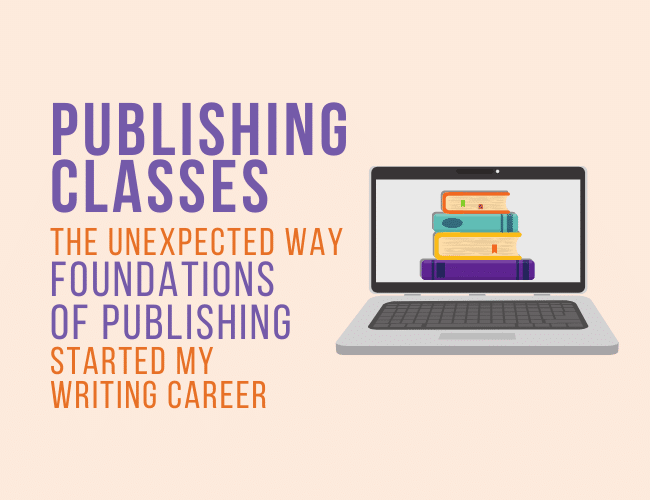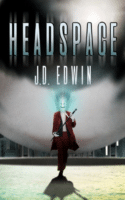So you've finished your book. Have you been looking at publishing classes to figure out how to bring your story into the world? I did years ago.
It was 2013.

MLK’s “I Have a Dream” speech was turning fifty, I had just switched from a very toxic day job to a much more peaceful one, and I had become determined to take my writing career a little more seriously. I researched publishing classes on how to publish, and landed upon the Foundations of Publishing program (then called Write to Publish).
It’s worth mentioning that I went into this program with the utmost confidence.
I had self-published a book the year before, and although it only sold a meager eleven copies, I was convinced that the only issue with it was that I didn’t know how to market, and that if I had just learned the “trick” to attracting an agent or publisher, I would surely become an instant success.
And so I signed up, prepared myself, and thought for certain that I was only weeks away from becoming a best-selling writer.
Then came the first challenge.
While writing wasn't new to me, I had no idea everything I actually needed to know if I was going to publish successfully. There were a lot of lessons left for me to learn.
I Had a Lot Left to Learn From This Publishing Class
If you ever decide to take a publishing class, particularly Foundations of Publishing, you'll see that, right away, Joe Bunting, the leader and creator of The Write Practice, calls you to take on a simple task: write a short story.
The first time I crossed this, I felt resistant. To put it simply, I felt myself “above” short stories.
Why write short stories when I can write novels?
Why should I try to lower myself to a measly short story when I’ve already finished a 150K word book?
But since I wasn’t about to abandon a program on the first assignment, I decided to, begrudgingly, write this short story. Immediately I learned my first lesson: short stories are hard.
You Can Learn a Lot by Writing a Short Story
With a length limit in place, every word had to count. I was used to rambling for pages on a character’s tragic backstory involving a candle and a chair, or the color and decor of a very specific teahouse.
I struggled hard, threw together a semi-passable story, and posted it for review in the forum. The feedback I received was politely positive, but I could tell there was nothing about my story that stood out. I fumbled around with the piece, trying to pinpoint why it wasn’t good, and met my next big obstacle.
I didn’t know how to fix it.
Writing is One Thing, Revising is Another
I went through the rest of the program feeling rather deflated, following the steps to publish on Amazon as closely as I could, but when it came time to hit that button, I stopped.
I couldn’t allow myself to publish this story that I didn’t even like. It felt somehow like compromising my integrity as an author.
And so it was then that Foundations of Publishing taught me the most important lesson I’ve learned to date: when to admit I wasn’t ready to publish my story (yet).
This may sound like a step back, and for a while it was. I stepped away from writing and The Write Practice, for three years.
During this time, I went through exhausting fertility treatments to have my first child, which was then followed nine months later by the surprise pregnancy of my second child. Then, in 2016, when I was tired and sleep deprived during my second maternity leave, I received an email from The Write Practice.
They were calling for entries to the Spring Writing Contest. I was very hesitant to enter a story. But this email sat with me.
Why Writing Returned to My Life
As I said, the email felt intimidating to me. After all, I hadn’t written in years. In fact, I’d started to convince myself that I didn’t want to be a writer after all.
But something about the contest called to me, and I made a decision to try to learn how to write.
Up until this point, I’d very much been a member of the “writing can’t be taught” camp. I believed that you were either good at writing or you weren’t.
But now that I’d admitted maybe I wasn’t quite ready to give up on this dream, I decided to take a chance. Why not?
I was too tired to do anything but sit around and wait for my newborn to wake up to be fed again anyway. I’d give these “writing books” a try. I decided to go with one by my favorite author, Stephen King: his classic book On Writing. I figured if the book had nothing to offer, then at least I should enjoy it.
That book changed my life.
For the first time, I realized writing can truly be taught and learned. I read through the book, took away a number of tips and tools, and decided to enter the contest. But, wary of trying to write a new story, I dug up the only proper short story I’d never written: the same one I wrote for Foundations of Publishing three years prior.
I can admit now that technically this was cheating. We weren’t supposed to use a story we’d written before.
But it was three years old, poorly crafted, and never published. There was a lot of room for improvement, and it might not even be the same story it started out as after I finished working on it.
I dusted it off, read it through, and saw that it had good bones but terrible everything else. This time though, I knew how to fix it.
P.S. Want to learn the story principles you need to fix your stories? Check out the Six Elements of Plot here on The Write Practice.
Turning Something Rough Into a Publishable Story
I modified the story to better fit the contest theme, then I implemented a number of tools learned from On Writing. The biggest tool I learned? “Everything must be story.” I polished it and submitted it, with a modicum of hope that it was at least not embarrassing.
This story is Wingtips, for those who are interested in reading it.
It went on to place sixth among the six winners of the contest, and became the first of my many stories published on Short Fiction Break.
Two years after this restart to my writing journey, I felt ready to take on another challenge—writing another book. This time, I told myself, it was going to be good. I was better prepared, I had a plan, and I'd found tools that worked for me. I sat down to write, and told myself I'm going to get this story out, no matter what.
And if it didn't turn out well . . . then no one has to know, right?
I wrote this book. Then rewrote it. Just as I was debating what to do with it, another opportunity presented itself—One Year to Publish, The Write Practice's mastermind publishing course, was opening up. I signed up, took my book, and nervously presented it for the first time to a panel of peers.
They confirmed what I worried about but deep down knew was true—the book is good.
One Year to Publish happens to include Foundations of Publishing as part of its program. Stepping back into where I started years ago was rather strange, but at the same time, a major boost in confidence. Because this time, I finally had a book that I can be proud of, and calling myself an author felt much less like being an imposter. The program taught me how to take authorship a step further, and this time I was able to follow it, building up my website and creating my online presence.
Where it humbled me before, it now lifted me up.
This book is Headspace. It is due to be published this summer by Story Cartel Press.
In short, I embraced the reality that you can learn to write.
And because of this, I started to implement all the additional lessons I learned in Foundations of Publishing, like why it's important to share my stories, and how to publish them.
 Want to read my upcoming novel? Headspace will be published in July 2021, but you can read it now for free when you join my launch team! Send an email to admin@thewritepractice.com to let me know you're in. I can't wait to see what you think!
Want to read my upcoming novel? Headspace will be published in July 2021, but you can read it now for free when you join my launch team! Send an email to admin@thewritepractice.com to let me know you're in. I can't wait to see what you think!Humbling Yourself Before Publishing
No matter the progress I’ve made, I still look back to that very first time I joined The Write Practice, and the difficult lesson I learned through the publishing class Foundations of Publishing.
The fact is, I don’t think I would’ve ever humbled myself to truly learn to improve my craft if the program hadn’t shown me my limitations. Even though I almost gave up on writing afterwards, recognizing my own shortcomings pushed me to take an honest look at myself, go back to basics, and become a more competent writer than I’d ever been.
One Year to Publish is now accepting applications. If you're looking for a publishing class that will help you write your best book and publish it like a pro, One Year to Publish might be for you.
If you’ve joined the program, I wish you well! If you haven’t, I highly recommend it.
Whether it gives you the boost you need to finally get published, or a much-needed reality check like it provided me, it’s an opportunity not to be missed. Sometimes you find what you need most in unexpected places.
Finish your book and publish it like a pro.
In One Year to Publish, you'll get the training and support you need to write, edit, and publish your book. Applications are open for a limited time, so check it out and apply today:
Have you ever felt afraid to publish or share your stories? Do you think it was because they weren't ready yet? Let us know in the comments.
PRACTICE
It might feel strange to write a short story if you've already completed a book, but writing a really great short story can actually help writers improve their craft at any stage of their writing career.
Which brings me to today's practice challenge: come up with a short story idea and write a premise for it. Spend fifteen minutes doing this, and then set a word count for your short story.
Share that idea and your word count in the comments section and comment on at least two other posts (don't be afraid to ask them to critique your premise, too!). Then, go write it. Maybe this will be the next short story you enter into a contest, or use for your own enrollment in Foundations of Publishing!
J. D. Edwin is a daydreamer and writer of fiction both long and short, usually in soft sci-fi or urban fantasy. Sign up for her newsletter for free articles on the writer life and updates on her novel, find her on Facebook and Twitter (@JDEdwinAuthor), or read one of her many short stories on Short Fiction Break literary magazine.



0 Comments